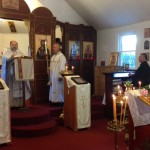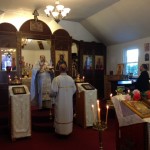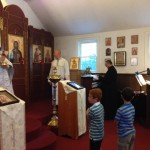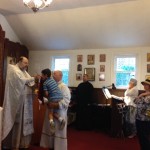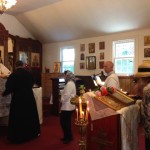On August 24, on the 11th Sunday after Pentecost our Parish community had a nice liturgical celebration. St. George’s Rector, Archpriest Igor Tarasov served the Divine Liturgy in our church. After the Gospel reading he preached the following homily:
“Today’s Gospel lesson tells us a parable about a cruel and unmerciful lender who himself owed ten thousand talents to the king, but did not wish to forgive his fellow servant a debt of one hundred denarii.”
“This parable teaches us how kind and merciful is our Lord. In this parable He is shown as a kind king who forgives a large debt and releases his servant. The servants in the parable are us, people. We are the servants of God. And our Lord constantly forgives us our debts, our transgressions. We have a lot of them in our life. Just think how many sins a person commits during the lifetime? But if he or she sincerely repents and asks forgiveness, God in His compassion forgives all of them. However, the compassionate Lord is expecting from us a similar compassion towards our neighbors, all other people. It is no accident that the Lord’s Prayer has the words: “and forgive us our debts, as we forgive our debtors”. God’s forgiveness of our sins depends on our forgiveness of the sins of others against us. If we will act like an unmerciful servant, the Lord will justly condemn us for our transgressions. And our Lord finishes the parable with the words: “So My Heavenly Father also will do to you if each of you, from his heart, does not forgive his brother his trespasses” (Mt. 18, 35).”
“Unfortunately, we do not always remember that God’s command to forgive from our heart the trespasses of our brothers. During the course of our lifetime we may see many times how people fight, argue and hate each other because of the fact that someone offended someone and there is no forgiveness. Some people do not wish to forgive. It is sad, but they may finally receive a due condemnation from our Lord at the Last Judgment.”
“We should also note the huge difference between our trespasses against God and the trespasses of our neighbors against us. We commit sins every day. And every sin is an offense of God’s majesty, His infinite goodness. Thus we owe God the whole lifetime. And our lifetime is full of sins, full of lesser or greater transgressions. At the same time, another servant owed his fellow servant one hundred denarii. And that was an average wage for one hundred days of labor. Perhaps, it was much, but it may not be compared to ten thousand talents owed to the king. Ten thousand talents was a very large amount of money, the amount someone could never earn even in the course of a lifetime! But we often make a big deal out of trespasses of our brothers against and do not wish to forgive. God forgives us terrible iniquities while we do not wish to forgive insignificant shortcomings.”
“An example could be how we carelessly omit the church services during the week. It is not a very direct example, but it does illustrate how different are our trespasses against the Lord and the trespasses of other people against us. Many religious people come to the church on Sundays, and thank God that they do. But many of them do not come on other days, when we celebrate some feasts. Many parishioners may have an excuse if they are busy during the week, if they are working. But in many instances our parishes are full of elderly people who are retired and could visit the temple on weekdays. If they don’t come on great holy days, they commit a grave sin of neglect. But many may not realize that. However, if someone did not come to them on the occasion of their personal celebration, they would be offended. They would be not easy to forgive. Some may not forgive at all – depending on a personality. But God forgives us our trespasses if we do repent.”
“Thus, having in mind the parable on a merciful king and unmerciful servant, let us be understanding towards the shortcomings of our neighbors and forgive them their trespasses. For God forgives us ours. Let us be compassionate towards other people and excuse their defects. For God excuses our shortcomings and forgives us. Let us be kind and forgive if our neighbors offend us. For the Lord is kind and forgives the offenses and iniquities we commit against Him if we repent. Let us do that, so the Lord may be merciful to us and forgive us our debts as we forgive our debtors.”
After the Liturgy dismissal the Rector reminded parishioners about the approaching great holy day of the Most Holy Mother of God – Her Dormition. He called faithful to prepare for this feast and to attend the church on that important occasion.

